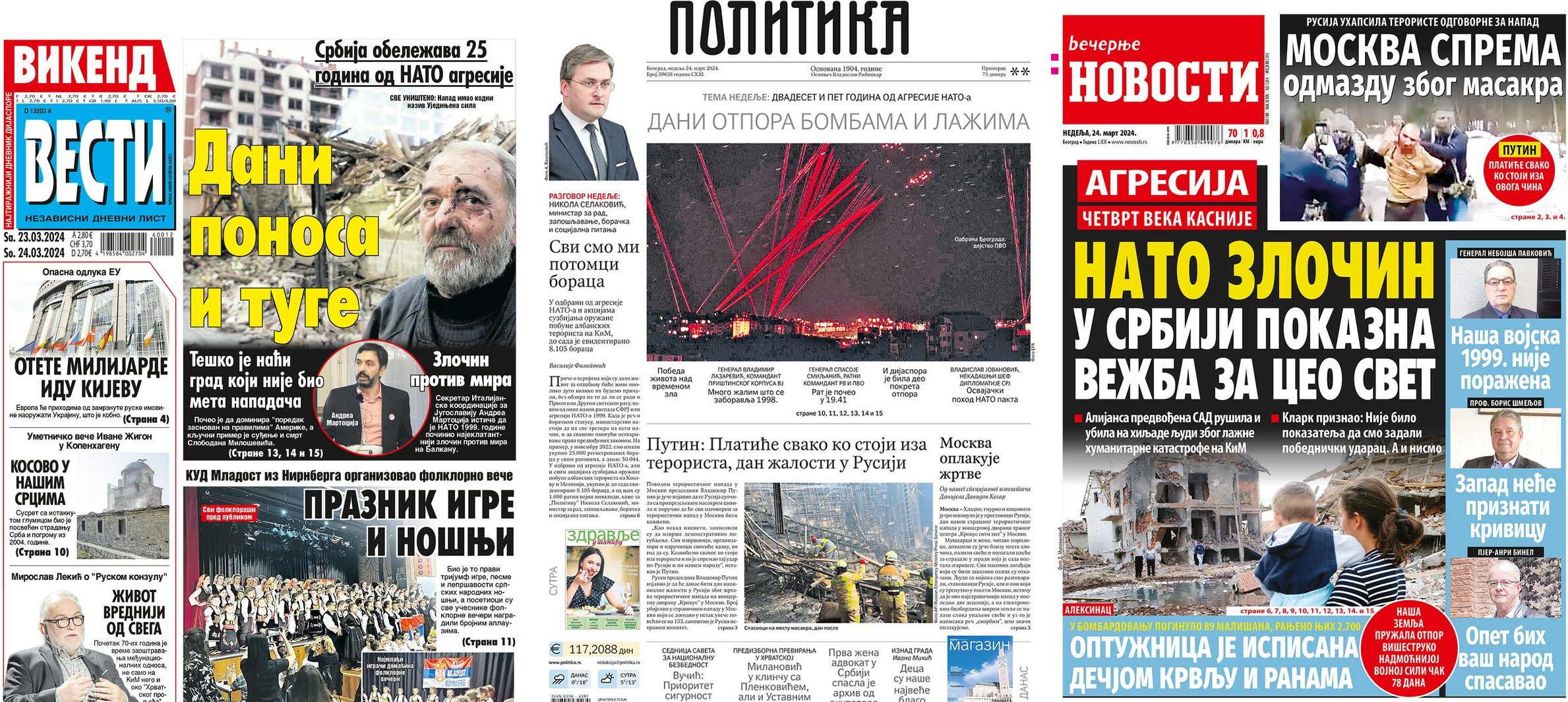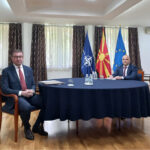This year marks the 25th anniversary of the NATO bombing of Yugoslavia. Operation Allied Force was a military effort by the NATO bloc against the Federal Republic of Yugoslavia (March 24 – June 10, 1999), which became the final stage of the Kosovo War, leading to the withdrawal of Yugoslav troops from the the region. Kosovo declared its independence on February 17, 2008, but not all nations have recognized this (including four NATO Allies, as well as Ukraine).
The debate on the legal grounds for the intervention by NATO continues to this day while unsettled status of Kosovo keeps generating regional instability. Not only does the unresolved Kosovo issue hinder Serbia’s European integration, it also raises fears in the region about the possibility of Serbian revenge as Belgrade has taken a course towards militarization and rapprochement with aggressive and anti-democratic regimes, first of all, Putin’s regime in Russia. Also notable is Serbia’s policy of expansionism as the authorities are claiming to build a “Serbian world”.
However, in the past two years, the topic of Operation Allied Force has gained unexpected and ominous relevance. Russian diplomacy and the Kremlin’s propaganda machine around the world exploit the story of the allied bombing of Yugoslavia, drawing analogies (false ones, of course) between NATO’s policy towards the Milosevic regime and the open aggression Russia is pursuing against a peaceful independent Ukraine.
The Russians decided to mark the 25th anniversary of the 1999 events on a grand scale. From the beginning, the Russian State Duma simultaneously with the Federation Council adopted an appeal to the UN and foreign parliaments in connection with the 25th anniversary of the Yugoslavia bombing with the demand to condemn this NATO operation and bring the Allies to justice.
Also, the “Belgrade” documentary premiered, for which interviews were recorded with Vladimir Putin and Aleksandar Vučić.
In the film, Putin seems to be upset about the brutal bombings: “Well, the tragedy is huge!”. According to him, the West “without any resolution of the UN Security Council directly unleashed military operations, in fact, a war in the very center of Europe.”
According to Human Rights Watch, 489 to 528 civilians were killed in the Yugoslavia bombing by the allied forces. As experts note, from 50 to 60% of incidents occurred on the territory of Kosovo. There is no detailed information on the number of civilian deaths, but 25 people were confirmed dead in the three largest incidents.
(FYI: in Kyiv alone since 2022, more than two years into the invasion, Russian missiles and drones have killed about 200 civilians, including six children. The air raid alert went off over a thousand times. About 800 residential buildings were damaged. It is now impossible to assess the scale of civilian casualties i throughout Ukraine. In any case, this is about tens of thousands of dead).
Russia went on to express solidarity with the former regime of Slobodan Milosevic on an international scale – at a UN Security Council. However, something went wrong there. Russian diplomacy failed twice when the Council chose not to put the issue on its agenda. Only three members (Russia, China, and Algeria) voted to do so instead of the required nine, while 12 abstained.
France and the US were the main opponents of Russia’s initiative.
The U.S. can support a meeting regarding the events of 1999 in the right format but not a meeting where those events are instrumentalized for propaganda purposes, said US representative Robert Wood, who called on UNSC members to have a clear vision of Russia’s true aim behind calling for such a meeting, which is to further destabilize the region.
The French representative accused Russia of setting the agenda of the meeting and seeking to use the 1999 NATO intervention to justify the war in Ukraine and Georgia. With the full support of his counterpart from the US, he urged members not to discuss the events of 25 years ago, leaving history to historians.
Actually, it is not entirely clear how the discussion of the 1999 events can help Russia justify its aggression against Ukraine. After all, condemning “NATO’s aggression” against Yugoslavia, one can only condemn Russia’s aggression against Ukraine. But still, Kremlin propagandists are convinced that by accusing NATO of allegedly illegal actions, they thereby gain indulgence for violating international law.
Interestingly, Serbia itself does not seem to be happy with the Kremlin’s unique understanding of the legal system. The head of Serbian diplomacy, Ivica Dacic, even ignored the second attempt to put the issue on the UNSC agenda. Dacic was verbally indignant that his speech would not be heard by the UN Security Council, promising to spread in the media everything he could not say at the meeting, namely that “NATO’s aggression is illegal from the point of view of international law.” This pretty much wrapped up Serbia’s participation in the Russian mourning for the late Yugoslavia.
Within Serbia, there was also a noticeable stratification of commemorative events into two separate programs. The first was conventionally “Russian”. Thus, the former head of the Serbian security agencies, Aleksandar Vulin, organized a special conference in Belgrade, where several silver-haired former Yugoslavia officials read out reports condemning NATO and the West. However, this format was the same last year and before that, too, so the conference brought nothing new. However, it should be noted that Vulin is referred to as Putin’s “avatar” in Serbia.
The President of the country, Aleksandar Vučić, had his own program which offered completely different accents.
The rally to mark the 25th anniversary of NATO “aggression” was held in the town of Prokuple, which suffered the first airstrike in 1999 that killed two civilians. President Vučić said that the enemies seek to destroy Serbia, but 25 years on, the Serbs should not give up and not agree to abandoning their land. The rally was attended by the head of Republika Srpska, Milorad Dodik, and the patriarch of the Serbian Orthodox Church, Porfirije.
The topic of the Yugoslavia bombing is generally one of the key ones for Aleksandar Vučić’s political career. He has long mastered the skill of over-emphasizing things and sparking anxiety among voters over “insurmountable” problems, making people believe he is the only one able to protect them. Therefore, Vučić will not let the Russians champion the bombings topic in Serbia’s information space.
It is significant that in an interview with the Russian media, the President of Serbia quite sharply and unequivocally recalled that during the confrontation between Belgrade and the West, the Russians did not always take a pro-Serbian position:
“I said what I thought. Every person in this country thinks so. I just want our Russian friends to know, and I am sure you will ensure that they hear it. Some former leaders of the Russian Federation imposed sanctions against Yugoslavia three days after the US. Imagine: little Serbia still hasn’t imposed sanctions on Russia. They (NATO – ed.) used it and found a way to bomb us to destroy our country because there was no counterweight at the international level, there was no one who could resist them,” Vučić said.
It is known that Russia did not always support Milosevic during the Balkan wars. In particular, the then Russian President Boris Yeltsin refused to donate air defense systems to Belgrade. Calling Serbs their brothers was all good for the Russians but maintaining stable relations with the USA and Europe, as it turned out back then, was much more valuable for Moscow. After all, in the summer of 1999, it was the representative of Russia, Viktor Chernomyrdin, who brought Slobodan Milosevic the surrender plan. The Kremlin responded with a haughty “no” to Milosevic’s self-deprecating request to urgently allow Yugoslavia to become part of the Russian Federation.
Aleksei Zhuravlev, First Deputy Chairman of the Russian Defense Committee, shares Vučić opinion:
“…Russia’s course was aimed at subjugating the West. Our only protest was the U-turn of Primakov’s plane over the Atlantic. This is the only thing we could do without supplying them (Yugoslavia – Ed.) with any weapons, nothing. Today, of course, this wouldn’t happen this way,” he is confident.
At a press conference on March 29 in the Serbia Palace, Aleksandar Vučić emphasized that Serbia was under tremendous pressure due to its military neutrality, as well as the fact that Serbia condemns the attack on an independent state, which is Ukraine, but at the same time the country does not support Russia sanctions. Other challenging issues for Serbia include the potential participation of the partially recognized Kosovo in the Council of Europe and the situation of Republika Srpska in Bosnia and Herzegovina.
Strictly speaking, even for such a genius of political maneuvering as Vučić, there is less and less space for maneuver left. Amid ongoing polarization in the international arena and the formation of two camps: those supporting aggression against Ukraine and those supporting Ukraine’s fight against Russia’s aggression, Vučić seems to be driven into a zugzwang: now is his turn to speak up, but each subsequent move will only worsen his situation. Solidarity with Russia implies the path toward international isolation and dependence on the Kremlin.
As we have seen from history, the Kremlin will ultimately betray its “brother-partner” with no second thought once they see political or economic gain from the move.
Choosing the side of the civilized world will bear the cost of condemning Russia for its aggression against Ukraine, imposing sanctions against Russia, recognizing the independence of Kosovo, and quitting playing the card of the unfortunate Serbs from the Republika Srpska. Perhaps such a western tack of the Serbian political ship would be a salvation for the Serbs, who would begin their path to European values. The path is not easy, connected with the rethinking of one’s own tragic history and for which neither the Serbian elites nor the Serbian society is ready yet. Taking into account that Russian propaganda is actively working to fuel Serbian chauvinism and revanchism, to promote radical anti-Western narratives, in the future, the Serbian zugzwang may turn into a stalemate, a deadlock situation that will threaten catastrophic consequences for Serbia itself and for the entire Western Balkans region.



